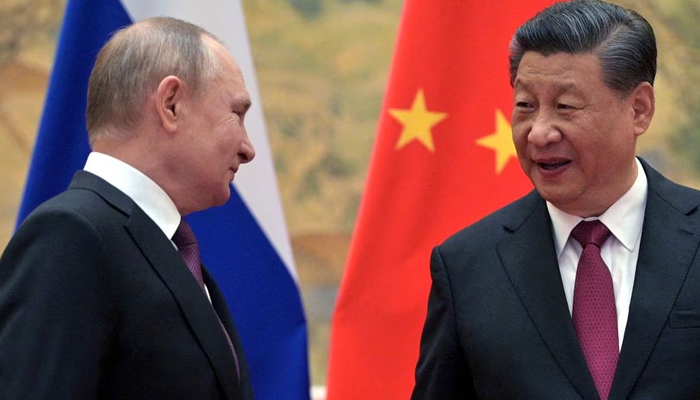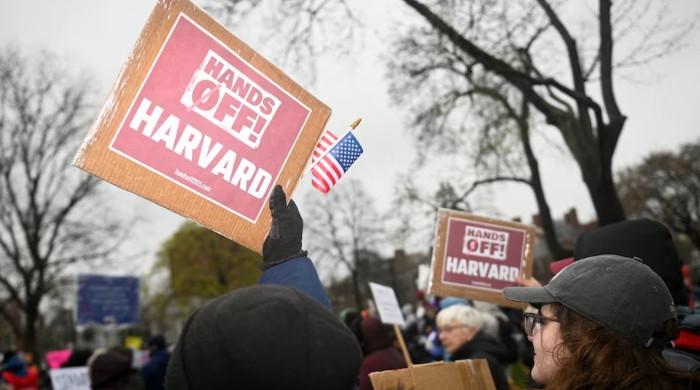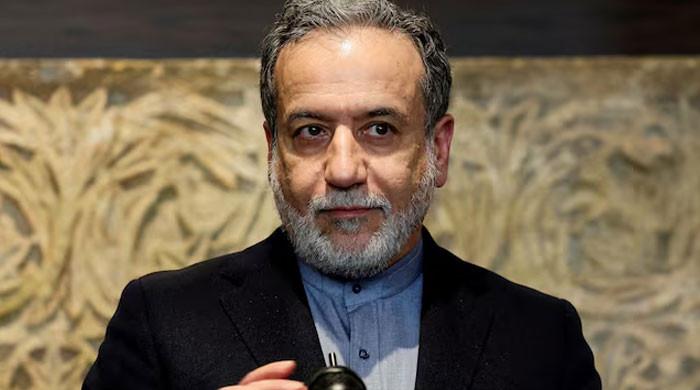Russia, China to close ranks at SCO amid strained ties with West
Kremlin confirms Putin will address the summit, while Chinese state media also reports Xi Jinping will take part in SCO
July 04, 2023

As Shanghai Cooperation Organisation (SCO) commences its summit in India Tuesday, President Xi Jinping and Vladimir Putin are to address the regional group, with Iran also participating as a full member for the first time, amid the war ongoing in Ukraine.
70-year-old Putin will be appearing for the first time since he faced a short-lived mutiny last month after the head of the Wagner mercenary group, Yevgeny Prigozhin, led a failed rebellion against Moscow, claiming to have taken control of key military facilities.
India is hosting the virtual summit of the eight-member SCO — headquartered in Beijing but hosted by New Delhi which holds the rotating chair — alongside the leaders of Russia, Pakistan and several Central Asian countries.
The world is waiting to see how the Russian President fares at this international event after successfully neutralising a small-scale mutiny by a private military contractor led by his former associate Yevgeny Prigozhin.
The Kremlin has confirmed Putin will address the summit, while Chinese state media also reported Xi Jinping will take part.
Created in 2001 to discuss security and economic matters, other SCO members are Kazakhstan, Kyrgyzstan, Pakistan, Tajikistan and Uzbekistan, with countries including Belarus and Mongolia invited as observers.
Encompassing a vast stretch of the globe from Moscow to Beijing, the bloc makes up around half the world's population — when including both member states as well as observer and "dialogue partner" nations.
What do analysts say?
Derek Grossman, a senior defence analyst at the Rand Corporation, a US-based think tank, said: "It's virtual, so they’re not going to be there in person, otherwise they would be standing alongside each other, fellow strongmen showing strength."
"If Putin is kind of shaken by this [insurrection] visibly, then that would tell them something — that even the strongest of strongmen is not necessarily immune to potential insurgencies within their countries," Grossman said.
The China-led SCO is focused on increasing regional security and economic cooperation, combating terrorism and drug trafficking, fighting climate change and the situation in Afghanistan after the Taliban assumed Kabul in 2021.
According to the analysts, as the Ukrainian conflict was not a feature of the SCO foreign minister's meeting in India in May, its impacts were felt by countries all over the world.
The forum — which came into being in 2001 — is crucial for Russia as it shows that the West could not isolate Moscow.
"This SCO meeting is really one of the few opportunities globally that Putin will have to project strength and credibility," said Michael Kugelman, director of the Wilson Center’s South Asia Institute.
"Putin will want to reassure his partners that he is very much still in charge, and leave no doubt that the challenges to his government have been crushed," said Tanvi Madan, a senior fellow at the Brookings Institution.
The meeting provides India with an opportunity to exert its diplomatic muscles showing a strong country in the region as PM Narendra Modi last month was hosted in the White House during his official trip to the US where he met a number of business leaders among others.
"India glorifies in this type of foreign policy where it’s wheeling and dealing with everybody at the same time," said Grossman referring to India's cordiality with the West and its opposing group.
Analysts noted that China, seeking to posture itself as a global force, is becoming a dominant player in forums like the SCO, where interest in full membership from countries like Myanmar, Turkey and Afghanistan has grown in recent years.
"For countries uncomfortable with the West and their foreign policies, the SCO is a welcome alternative, mainly because of the roles Russia and China play. ... I think that highlights just how relevant and concerning this group could be for a number of Western capitals, especially if it keeps expanding," said Kugelman.
'Diplomatic tightrope'
India, which is also to also host the G20 summit in September, is walking a diplomatic tightrope.
Uniquely, it is a member of both the SCO and the Quad, set up with the United States, Japan, and Australia to counter Beijing's growing assertiveness.
Indian Prime Minister Narendra Modi was last month hosted in Washington with all the full pomp of a state visit, where US President Joe Biden spoke of "two great friends and two great powers".
At the same time, Moscow remains by far India's biggest arms supplier — they have been allies for decades — and New Delhi has been an enthusiastic buyer of cut-price Russian oil during the war in Ukraine.
India, with a rapidly growing economy, has surpassed China as the world's most populous country and has a long-running territorial dispute with Beijing.
Iran is expected to join the grouping, with Tehran having intensified its diplomacy with friends and foes alike in recent months, seeking to reduce its isolation, improve its economy and project strength.
"This membership is beneficial both for Iran and for the organisation," Iran's foreign ministry spokesman Nasser Kanani said Monday, saying it would have "positive effects on economic development" between member nations.
India's arch-rival and neighbour Pakistan has also taken part, as Prime Minister Shehbaz Sharif called it an "important forum for regional security and prosperity" while speaking virtually.











